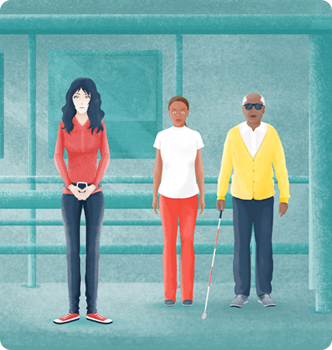Medical Professionals - Guide
As Assessment Providers providing reports to the DWP for Personal Independence Payment (PIP) cases, it’s our job to request the completion of factual reports from GPs and medical professionals. We do this where further evidence will help inform the advice our Health Professionals provide to the DWP.
We will only request a report where it is needed and not in every case.
What is Personal Independence Payment (PIP)?
Personal Independence Payment (PIP) is a benefit for people with a long-term health condition or impairment, whether physical, sensory, mental, cognitive, intellectual, or any combination of these. It is paid to make a contribution to the extra costs that disabled people may face, to help them lead full, active and independent lives.
A consultation for PIP considers a claimant’s ability to carry out a series of everyday activities as outlined in the DWP’s PIP Assessment Guide. People who are claiming PIP are assessed on functionality rather than diagnosis.
Our job is to assess and document how a person functions using the information provided by the claimant and medical professionals.
Why do we need supporting evidence?
Two people with the same diagnosis or condition may function very differently so it’s important we find out as much as we can. The evidence we collate from medical professionals is then used in our reports that we send to the DWP.
Up to date and relevant information is essential to this process and often if we have enough evidence from the factual report that is consistent, relevant and recent, we may not need to see a claimant for a consultation.
Both our HPs and DWP decision makers will refer to the information in the reports received from you to support the information in the PIP 2 Claim Form and link it into what Claimants tell us at a consultation.

What is required of you?
As per DWP’s guidance, please complete the forms you receive from us as fully as you can from your medical records and your knowledge of your patient. It is not necessary to interview or examine the patient in order to complete the report.
In the reports, DWP ask us to collate evidence based on clinical facts. If you would like to offer your opinion, please make sure it is supported by factual evidence. A summary of any relevant information in hospital letters can be helpful.
Examples of Evidence
- Letters from hospitals, GPs or specialists (but not appointment letters, we don’t need to see them)
- X-Ray, ultrasound or scan results
- Diagnostic Report (for example, Autism)
- Special Educational Needs Reports
- Prescriptions Occupational Therapy Reports or letters
- Summary of conditions
- Letters from Specialists (for example, MacMillan)
- Carers Assessment
- Social Worker Assessment
- Care Plans
- Psychiatrist or CPN report
- Evidence from Support Workers

Personal Independence Payment (PIP) activities
The consultation for PIP considers an individual’s level of ability to carry out a series of everyday activities. Evidence provided will help our HPs accurately reflect how a person functions when considering the following activities:
- Preparing food
- Taking nutrition
- Managing therapy or monitoring a health condition
- Washing and bathing
- Managing toilet needs or incontinence
- Dressing and undressing
- Communicating verbally
- Reading and understanding signs, symbols and words
- Engaging with other people face to face
- Making budgeting decisions
- Planning and following journeys
Returning reports in a timely fashion
The completed report should be returned within 5 working days from the date of receipt so the case can be processed without delay.
For further information please follow this link to the DWP guidance for Health Professionals.